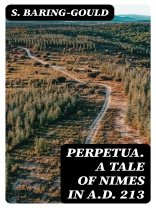In ‘Perpetua. A Tale of Nimes in A.D. 213, ‘ S. Baring-Gould weaves a rich narrative that immerses readers in the early Christian experience and the socio-religious context of the Roman Empire. The novel is characterized by its vivid descriptive style and profound character development, showcasing the trials faced by early Christians against a backdrop of persecution and moral dilemmas. Baring-Gould’s meticulous research into historical events and customs of the time infuses the story with authenticity, inviting readers to explore the intersection of faith, culture, and identity in a pivotal moment of history. S. Baring-Gould was a prolific author, clergyman, and folklorist, whose deep interest in spirituality and history profoundly influenced his writing. His passion for the early Christian era and the resilience of believers during times of strife is evident in his works. This personal connection likely stems from his own ecclesiastical background, which informed his understanding of the struggles faced by faith communities throughout history. ‘Perpetua’ is highly recommended for readers intrigued by historical fiction, theology, and cultural studies. Baring-Gould’s compelling storytelling and profound insights into the human condition make this novel not only an engaging read but also a thought-provoking exploration of faith and perseverance amid adversity.
Sobre el autor
Sabine Baring-Gould (1834-1924) was an English hagiographer, antiquarian, novelist and eclectic scholar. His literary career encompassed a diverse range of subjects including theology, folklore, history, and biography, earning him a reputation as a prolific Victorian writer. Baring-Gould is best remembered for penning the hymn ‘Onward, Christian Soldiers’ and his extensive work in the collection and preservation of folk songs. His scholarly pursuits were evident in his fiction which often interwove elements of history and folklore. ‘Perpetua. A Tale of Nimes in A.D. 213’ is one such historical novel that reflects his erudition and imaginative reconstruction of historical events. The narrative, set in the Roman Empire, showcases his interest in Christian martyrs and his ability to bring to life the intellectual and religious currents of past epochs. Baring-Gould’s literary style is marked by its Victorian sensibilities, combining detailed historical research with an engaging prose that resonates with the interests and tastes of his time. Through works like ‘Perpetua’, his legacy endures, offering readers a window into the past, crafted by the pensiveness and scholarly rigor that characterized much of his writing.












